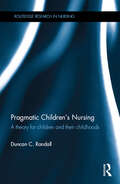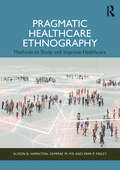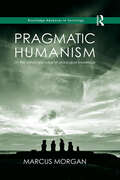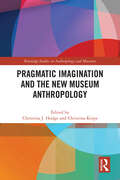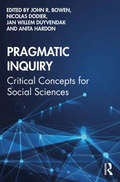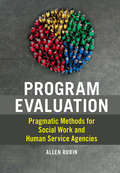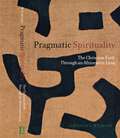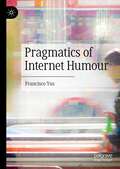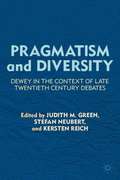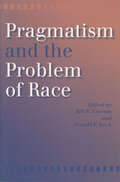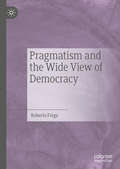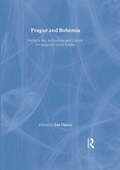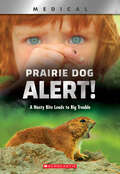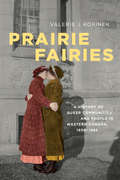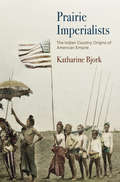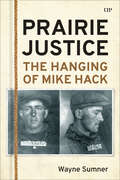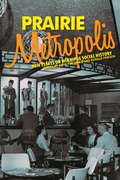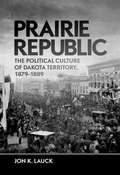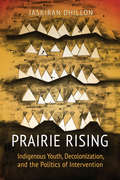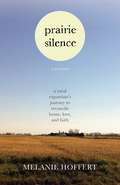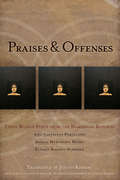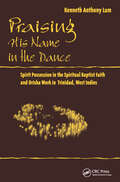- Table View
- List View
Pragmatic Children's Nursing: A Theory for Children and their Childhoods (Routledge Research in Nursing and Midwifery)
by Duncan C. RandallPragmatic Children’s Nursing is the first attempt to create a paediatric nursing theory which argues for the importance of giving children living with illness access to a childhood which is, as far as possible, equal to that of their peers. Set in the historical context of the development of children’s nursing, this theory is presented in detail as an educational process, complete with eight outcome measures which allow the practitioner to evaluate its effectiveness. This book explores the triad relationship between children, carers and nurses within the context of healthcare delivery. Ht analyses the moral and ethical implications of pragmatic children’s nursing, which challenges the established ideas of family-centred care. In addition to offering theoretical grounding and debate, Randall presents four practical case studies which model how this theory may work within various hospital and community settings. Establishing a link between the concepts inherent in pragmatism and our understanding of childhood within society, this accessible book will appeal to a global audience of undergraduate and postgraduate nursing students, researchers and policy makers. Discover more about this subject on our author Duncan C. Randall's website, which provides extra resources and information here: http://pragmaticchildrensnursing.com/
Pragmatic Existential Counseling and Psychotherapy: Intimacy, Intuition, and the Search for Meaning
by Jerrold L. ShapiroPragmatic Existential Counseling and Psychotherapy integrates concepts of positive psychology and strengths based therapy into existential therapy. Turning existential therapy on its head, this exciting, all-new title approaches the theory from a positive, rather than the traditional deficit model. Authored by a leading figure in existential therapy, Jerrold Lee Shapiro, the aim is to make existential therapy positive and easily accessible to a wide audience through a pragmatic, stage wise model. Shapiro expands on the work of Viktor Frankl and focuses on delivery to individuals and groups, men and women, and evidence based therapy. The key to his work is to help the client focus on resistance and to use it as a means of achieving therapeutic breakthroughs. Filled with vignettes and rich case examples, the book is comprehensive, accessible, concrete, pragmatic and very human in connection between author and reader. “This is a masterful primer on existential therapy that has been forged from the pen of a highly seasoned theorist, researcher, and practitioner. In Pragmatic Existential Counseling and Psychotherapy we gain the insight and personal experience of one who has lived and breathed the field for over 50 years—alongside some of the greatest practitioners of the craft, most notably Viktor Frankl. This volume is superb for students interested in a broad and substantive overview of the field.” —Kirk Schneider, Columbia University
Pragmatic Existential Counseling and Psychotherapy: Intimacy, Intuition, and the Search for Meaning
by Jerrold L. ShapiroPragmatic Existential Counseling and Psychotherapy integrates concepts of positive psychology and strengths based therapy into existential therapy. Turning existential therapy on its head, this exciting, all-new title approaches the theory from a positive, rather than the traditional deficit model. Authored by a leading figure in existential therapy, Jerrold Lee Shapiro, the aim is to make existential therapy positive and easily accessible to a wide audience through a pragmatic, stage wise model. Shapiro expands on the work of Viktor Frankl and focuses on delivery to individuals and groups, men and women, and evidence based therapy. The key to his work is to help the client focus on resistance and to use it as a means of achieving therapeutic breakthroughs. Filled with vignettes and rich case examples, the book is comprehensive, accessible, concrete, pragmatic and very human in connection between author and reader. “This is a masterful primer on existential therapy that has been forged from the pen of a highly seasoned theorist, researcher, and practitioner. In Pragmatic Existential Counseling and Psychotherapy we gain the insight and personal experience of one who has lived and breathed the field for over 50 years—alongside some of the greatest practitioners of the craft, most notably Viktor Frankl. This volume is superb for students interested in a broad and substantive overview of the field.” —Kirk Schneider, Columbia University
Pragmatic Healthcare Ethnography: Methods to Study and Improve Healthcare
by Erin P. Finley Alison B. Hamilton Gemmae M. FixThis practical and accessible textbook provides an overview of the key principles for conducting ethnography in healthcare settings. Shedding new light on healthcare delivery and experiences, ethnographic research methods provide a useful set of tools for observing how people act in the world and help us understand why people act as they do. Increasingly recognized for their explanatory power, especially around behavior and social context, ethnographic methods are an invaluable approach for understanding challenges and processes in healthcare services and delivery.This guide takes the reader step-by-step through the research process, from grant writing and study design to data collection and analysis. Each chapter, illustrated by a range of examples, introduces ethnographic concepts and techniques, considers how to apply them in pragmatic research, and includes suggestions for tips and tricks. An in-depth case study describing real-world ethnographic research in a healthcare setting follows each chapter to demonstrate both the “how to” and the value of ethnographic approaches. The case studies discuss why the researcher used ethnography, the specific approach taken, the setting for the work, and key lessons that demonstrate ethnographic principles covered in the related chapter.This is an essential text for researchers from a range of health-related backgrounds new to ethnographic methods, including students taking courses on qualitative research methods in health, implementation science, and applied anthropology.
Pragmatic Humanism: On the Nature and Value of Sociological Knowledge (Routledge Advances in Sociology)
by Marcus MorganIs sociology best understood as simply chipping away at our ignorance about society, or does it have broader roles and responsibilities? If so, to what—or perhaps to whom—are these responsibilities? Installing humanity as its epistemological and normative start and endpoint, this book shows how humanism recasts sociology as an activity that does not merely do things, or effect things, but is also self-consciously for something. Rather than resurrecting problematic classical conceptions of humanism, the book instead constructs its arguments on pragmatic grounds, showing how a pragmatic humanism presents an improved picture of both the nature and value of the discipline. This picture is based less around the claim that sociology is capable of providing authoritative revelations about society, and more upon its capacity to offer representations of the social in epistemologically open, transformative, ethical, and hopeful ways. Ultimately, it argues that sociology’s real value can only be disclosed by replacing its image as a discipline aimed towards disinterested social enlightenment with one of itself as a practice both dependent upon, and at its best self-consciously aimed towards, human ends and imperatives. It will appeal to scholars and students across the social sciences, and to those working in social theory, sociology, and philosophy of the social sciences in particular.
Pragmatic Imagination and the New Museum Anthropology (Routledge Studies in Anthropology and Museums)
by Christina Kreps Christina J HodgePragmatic Imagination and the New Museum Anthropology shifts museum anthropology’s relationship to the broader field from marginal to central by revealing the sophisticated transdisciplinary praxis (theory + practice) at the heart of current museum anthropologies. The book features international case studies that operate at the interfaces of critical museology, anthropology, material culture studies, art practice, and more. The theory of pragmatics proposes that meaning-making is collaborative and best evaluated through its impact in the world. Collectively the chapters in this volume evidence a ‘pragmatic imagination’ at work as museum anthropology practitioners ingeniously combine inventiveness (the possible) and practicality (the actual) in ways that drive the field forward. Defining museum anthropology as a pragmatic practice explicitly theorizes this work in order to mark its significance; demystify its processes of knowledge production; connect it more readily to debates within and beyond anthropology; and facilitate critique.
Pragmatic Inquiry: Critical Concepts for Social Sciences
by John R. BowenThis book examines a range of critical concepts that are central to a shift in the social sciences toward "pragmatic inquiry," reflecting a twenty-first century concern with particular problems and themes rather than grand theory. Taking a transnational and transdisciplinary approach, the collection demonstrates a shared commitment to using analytical concepts for empirical exploration and a general orientation to research that favors an attention to objects, techniques, and practices. The chapters draw from broad-based and far-reaching social theory in order to analyze new, specific challenges, from grasping the everyday workings of markets, courtrooms, and clinics, to inscribing the transformations of practice within research disciplines themselves. Each contributor takes a key concept and then explores its genealogies and its circulations across scholarly communities, as well as its proven payoffs for the social sciences and, often, critical reflections on its present and future uses. This carefully crafted volume will significantly expand and improve the analytical repertoires or toolkits available to social scientists, including scholars in sociology or anthropology and those working in science and technology studies, public health, and related fields.
Pragmatic Program Evaluation for Social Work: An Introduction
by Allen RubinBe prepared for your future role in a service-oriented agency. This textbook provides practical guidance on program evaluation while avoiding replicating other course material. Drawing on over 40 years of subject knowledge, Allen Rubin describes outcome designs that are feasible for service-oriented agencies and that match the degree of certainty needed by key users of outcome evaluations. The utility and easy calculation of within-group effect sizes are outlined, which enhance the value of evaluations that lack control groups. Instructions are also given on how to write and disseminate an evaluation report in a way maximizes its chances of being used. Conducting focus group interviews and capitalising on the value of non-probabilitysamples will become second nature after following the effective and pragmatic advice mapped out chapter-by-chapter.
Pragmatic Spirituality: The Christian Faith through an Africentric Lens
by Gayraud S. WilmoreGayraud S. Wilmore, an internationally renowned scholar of the history of the African American church, is one of the founders of black theology and author of Black Religion and Black Radicalism. Pragmatic Spirituality brings together some of his most compelling writings to speak to continuing issues in African American Christianity and black theology. The volume makes available for the first time several of Wilmore's previously unpublished essays, including a new chapter on womanist theology written for this book. Each chapter has been thoroughly reviewed and where appropriate reworked for this volume in order to create a coherent work which reveals a consistent "pragmatic spirituality" in African and African American religious practice. This book presents a view of the Christian faith and life at variance with the quest for personal sanctity by emphasizing communal empowerment for humanization and justice. Pragmatic Spirituality incorporates some of the most engaging of Wilmore's voluminous writings to reinstate a persistent theme: that black or Africentric faith transposes itself from basically numinous and ecstatic elements in African and African diasporic religions to the immediate and practical work of healing and empowering the poor and marginalized. This book transcends a narrow Africentrism to call for a broad acquaintance with a historic motif in black faith that has to do with compassion, justice, equality, and the liberation of all people. This illuminating volume displays Wilmore's influence on the development of black theology for over fifty years, and introduces his work to a new generation of scholars.
Pragmatics of Internet Humour
by Francisco YusThis book provides a first thorough analysis of internet humour from a cognitive-pragmatic perspective, covering a wide range of discourses that are pervasive online and focusing especially on messaging interactions, social networking sites and memes. Its chapters describe the inferential strategies implemented to turn online coded discourses into meaningful interpretations, which in turn can be devised and manipulated for the sake of humour. Furthermore, and apart from the typical object of pragmatic research (humorous discourses), the book emphasises the importance of the interfaces’ design and of the qualities of the users engaged in humorous interactions (called contextual constraints), additionally highlighting the parallel significance of the various effects, shaped as feelings and emotions, that stem from humorous communication on the internet. In sum, the book delivers a rich and detailed account of humorous internet discourses through dissecting their affordances as a medium, tracking the users’ intentions, and predicting the audiences’ interpretive strategies, with the goal of helping the reader obtain a better understanding of internet humour and its role in today’s online interactions.
Pragmatism and Diversity
by Kersten Reich Stefan Neubert Judith M. GreenDiversity is an unavoidable aspect of twenty-first century living. The authors in this volume engage in cross-difference conversations with other thinkers from earlier periods and other philosophical traditions in order to reconstruct pragmatism and cosmopolitanism in ways that are more attuned to our lived experience of diversity.
Pragmatism and the Problem of Race
by Bill E. Lawson Donald F. KochHow should pragmatists respond to and contribute to the resolution of one of America's greatest and most enduring problems? Given that the most important thinkers of the pragmatist movement--Charles S. Peirce, William James, John Dewey, and George Herbert Mead--said little about the problem of race, how does their distinctly American way of thinking confront the hardship and brutality that characterizes the experience of many African Americans in this country? In 12 thoughtful and provocative essays, contemporary American pragmatists connect ideas with action and theory with practice to come to terms with this seemingly intractable problem. Exploring themes such as racism and social change, the value of the concept of race, the role of education in ameliorating racism, and the place of democracy in dealing with the tragedy of race, the voices gathered in this volume consider how pragmatism can focus new attention on the problem of race.Contributors are Michael Eldridge, Eddie S. Glaude, Jr., Judith M. Green, D. Micah Hester, Donald F. Koch, Bill E. Lawson, David E. McClean, Gregory F. Pappas, Scott L. Pratt, Alfred E. Prettyman, John R. Shook, Paul C. Taylor, and Cornel West.
Pragmatism and the Wide View of Democracy
by Roberto FregaThe aim of this book is to provide a fresh, wider, and more compelling account of democracy than the one we usually find in conventional contemporary political theory. Telling the story of democracy as a broad societal project rather than as merely a political regime, Frega delivers an account more in tune with our everyday experience and ordinary intuitions, bringing back into political theory the notion that democracy denotes first and foremost a form of society, and only secondarily a specific political regime.The theoretical shift accomplished is major. Claiming that such a view of democracy is capable of replacing the mainstream categories of justice, freedom and non-domination in their hegemonic function of all-encompassing political concepts, Frega then argues for democracy as the broader normative framework within which to rethink the meaning and forms of associated living in all spheres of personal, social, economic, and political life. Drawing on diverse traditions of American pragmatism and critical theory, as well as tackling political issues which are at the core of contemporary theoretical debates, this book invites a rethinking of political theory to one more concerned with the political circumstances of social life, rather than remaining confined in the narrowly circumscribed space of a theory of government.
Prague and Bohemia: Medieval Art, Architecture and Cultural Exchange in Central Europe (The British Archaeological Association Conference Transactions)
by Zoe OpacicThis book explores the remarkable flourishing of art and architecture in Bohemia, and Prague as it became the political centre of Charles IV's Holy Roman Empire. It focuses on cultural exchange and the links that can be traced through the artwork across Europe.
Prairie Dog Alert!: A Nasty Bite Leads to Big Trouble (XBooks: Medical)
by Christen BrownleeThe family had no idea that adopting a prairie dog could result in contracting a life-threatening illness.Schyan Kautzer and her parents want a new pet, so they adopt a prarie dog. But one day Schyan gets a fever, and her body is suddenly covered with sores. The only clue to her illness is a bite from her pet prairie dog.High-interest topics, real stories, engaging design and astonishing photos are the building blocks of the XBooks, a new series of books designed to engage and motivate reluctant and enthusiastic readers alike. How can a bite from a pet prairie dog cause a life-threatening illness? Where does the guinea worm, a parasite that lives under human skin, come from? How can a virus that attacks the brain be related to birds dropping dead at the zoo? With topics based in science, these action-packed books will help students unlock the power and pleasure of reading... and always ask for more!
Prairie Fairies: A History of Queer Communities and People in Western Canada, 1930-1985 (Studies in Gender and History)
by Valerie KorinekPrairie Fairies draws upon a wealth of oral, archival, and cultural histories to recover the experiences of queer urban and rural people in the prairies. Focusing on five major urban centres, Winnipeg, Saskatoon, Regina, Edmonton, and Calgary, Prairie Fairies explores the regional experiences and activism of queer men and women by looking at the community centres, newsletters, magazines, and organizations that they created from 1930 to 1985. Challenging the preconceived narratives of queer history, Valerie J. Korinek argues that the LGBTTQ community has a long history in the prairie west, and that its history, previously marginalized or omitted, deserves attention. Korinek pays tribute to the prairie activists and actors who were responsible for creating spaces for socializing, politicizing, and organizing this community, both in cities and rural areas. Far from the stereotype of the isolated, insular Canadian prairies of small towns and farming communities populated by faithful farm families, Prairie Fairies historicizes the transformation of prairie cities, and ultimately the region itself, into a predominantly urban and diverse place.
Prairie Imperialists: The Indian Country Origins of American Empire (America in the Nineteenth Century)
by Katharine BjorkThe Spanish-American War marked the emergence of the United States as an imperial power. It was when the United States first landed troops overseas and established governments of occupation in the Philippines, Cuba, and other formerly Spanish colonies. But such actions to extend U.S. sovereignty abroad, argues Katharine Bjork, had a precedent in earlier relations with Native nations at home. In Prairie Imperialists, Bjork traces the arc of American expansion by showing how the Army's conquests of what its soldiers called "Indian Country" generated a repertoire of actions and understandings that structured encounters with the racial others of America's new island territories following the War of 1898.Prairie Imperialists follows the colonial careers of three Army officers from the domestic frontier to overseas posts in Cuba and the Philippines. The men profiled—Hugh Lenox Scott, Robert Lee Bullard, and John J. Pershing—internalized ways of behaving in Indian Country that shaped their approach to later colonial appointments abroad. Scott's ethnographic knowledge and experience with Native Americans were valorized as an asset for colonial service; Bullard and Pershing, who had commanded African American troops, were regarded as particularly suited for roles in the pacification and administration of colonial peoples overseas. After returning to the mainland, these three men played prominent roles in the "Punitive Expedition" President Woodrow Wilson sent across the southern border in 1916, during which Mexico figured as the next iteration of "Indian Country."With rich biographical detail and ambitious historical scope, Prairie Imperialists makes fundamental connections between American colonialism and the racial dimensions of domestic political and social life—during peacetime and while at war. Ultimately, Bjork contends, the concept of "Indian Country" has served as the guiding force of American imperial expansion and nation building for the past two and a half centuries and endures to this day.
Prairie Justice: The Hanging of Mike Hack (Osgoode Society for Canadian Legal History)
by Wayne SumnerIn May 1928, the body of George Edey was discovered on his Saskatchewan farm, leading to the swift arrest of a deaf and mentally disabled farmhand named Mike Hack. Following a three-day murder trial, Hack was quickly convicted and sentenced to death. Denied clemency, in January 1929 he was hanged in the courtyard of the Regina Jail at twenty-seven years of age and buried in an unmarked grave. Prairie Justice dissects this case, revealing its implications for important themes in the history of the Canadian criminal justice system. Wayne Sumner meticulously traces the narrative of the case, analysing each step from the initial murder investigation to the subsequent arrest, trial, conviction, denial of clemency, and execution of the man accused. Drawing on a personal connection to the case rooted in his family history – his father’s hometown was the village where the crime occurred, and both his grandfather and great-grandfather were involved in the investigation – Sumner uncovers deeper and more universal reasons to share the story. The book punctuates the narrative with insightful analysis on key criminal justice themes illustrated by the case: unfitness to stand trial, the defence of insanity, ineffective assistance of counsel, wrongful conviction, and miscarriage of justice. Ultimately, Prairie Justice exposes how access to justice can be merely illusory for the poor and marginalized.
Prairie Metropolis: New Essays on Winnipeg Social History
by Gerald Friesen Esyllt W. JonesAt the turn of the twentieth century, Winnipeg was the fastest-growing city in North America. But its days as a diverse and culturally rich metropolis did not end when the boom collapsed. Prairie Metropolis brings together some of the best new graduate research on the history of Winnipeg and makes a groundbreaking contribution to the history of the city between 1900 and the 1980s. The essays in this collection explore the development of social institutions such as the city’s police force, juvenile court, health care institutions, volunteer organizations, and cultural centres. They offer critical analyses on ethnic, gender, and class inequality and conflict, while placing Winnipeg’s experiences in national and international contexts.
Prairie Republic: The Political Culture of Dakota Territory, 1879-1889
by Jon K. LauckAMERICAN DEMOCRATIC IDEALS, civic republicanism, and Christianity were the dominant forces at work during South Dakota's formative decade. Territorial politics in the late nineteenth-century West is typically viewed as a game of unprincipled opportunism or as a drunken exercise in bombast and rascality. Now, Jon K. Lauck examines anew the values we like to think were at work during the founding of our western states. Taking Dakota Territory as a laboratory for examining a formative stage of western politics, Lauck finds that settlers from New England and the Midwest brought democratic practices and republican values to the northern plains and invoked them as guiding principles in the drive for South Dakota statehood. Prairie Republic corrects an overemphasis on class conflict and economic determinism, factors posited decades ago by such historians as Howard R. Lamar. Instead, Lauck finds South Dakota's political founders to be agents of Protestant Christianity and of civic republicanism-- an age- old ideology that entrusted the polity to independent, landowning citizens who placed the common interest above private interest. Focusing on the political culture widely shared among settlers attracted to the Great Dakota Boom of the 1880s, Lauck shows how they embraced civic virtue, broad political participation, and agrarian ideals. Family was central in their lives, as were common- school education, work, and Christian community. In rescuing the story of Dakota's settlers from historical obscurity, Prairie Republic dissents from the recent darker portrayals of western history and expands our view and understanding of the American democratic tradition.
Prairie Rising: Indigenous Youth, Decolonization, and the Politics of Intervention
by Jaskiran K DhillonIn 2016, Canada’s newly elected federal government publically committed to reconciling the social and material deprivation of Indigenous communities across the country. Does this outward shift in the Canadian state’s approach to longstanding injustices facing Indigenous peoples reflect a “transformation with teeth,” or is it merely a reconstructed attempt at colonial Indigenous-settler relations?Prairie Rising provides a series of critical reflections about the changing face of settler colonialism in Canada through an ethnographic investigation of Indigenous-state relations in the city of Saskatoon. Jaskiran Dhillon uncovers how various groups including state agents, youth workers, and community organizations utilize participatory politics in order to intervene in the lives of Indigenous youth living under conditions of colonial occupation and marginality. In doing so, this accessibly written book sheds light on the changing forms of settler governance and the interlocking systems of education, child welfare, and criminal justice that sustain it. Dhillon’s nuanced and fine-grained analysis exposes how the push for inclusionary governance ultimately reinstates colonial settler authority and raises startling questions about the federal
Prairie Silence: A Memoir
by Melanie HoffertA rural expatriate's struggle to reconcile family, home, love, and faith with the silence of the prairie land and its people Melanie Hoffert longs for her North Dakota childhood home, with its grain trucks and empty main streets. A land where she imagines standing at the bottom of the ancient lake that preceded the prairie: crop rows become the patterned sand ripples of the lake floor; trees are the large alien plants reaching for the light; and the sky is the water's vast surface, reflecting the sun. Like most rural kids, she followed the out-migration pattern to a better life. The prairie is a hard place to stay--particularly if you are gay, and your home state is the last to know. For Hoffert, returning home has not been easy. When the farmers ask if she's found a "fella," rather than explain that--actually--she dates women, she stops breathing and changes the subject. Meanwhile, as time passes, her hometown continues to lose more buildings to decay, growing to resemble the mouth of an old woman missing teeth. This loss prompts Hoffert to take a break from the city and spend a harvest season at her family's farm. While home, working alongside her dad in the shop and listening to her mom warn, "Honey, you do not want to be a farmer," Hoffert meets the people of the prairie. Her stories about returning home and exploring abandoned towns are woven into a coming-of-age tale about falling in love, making peace with faith, and belonging to a place where neighbors are as close as blood but are often unable to share their deepest truths. In this evocative memoir, Hoffert offers a deeply personal and poignant meditation on land and community, taking readers on a journey of self-acceptance and reconciliation.
PrairyErth: A Deep Map
by William Least Heat-Moon(from flaps) PrairyErth is a vigorous and exalted evocation of the American land, its people, its past, its hopes. The very word "prairyerth," an old geologic term for the soils of our central grasslands, captures the essence of the American tall- grass country. Only a writer of William Least Heat-Moon's gifts could find in a single Kansas county the narrative of an epic, the nonfiction equivalent of the great American novel. Robert Penn Warren pronounced Heat-Moon's Blue Highways "a masterpiece ... a magnificent and unique tour." That best-selling book described a 13,000-mile, 38-state automobile journey into America. Now Heat-Moon has pulled to the side of the road and set off on foot. Instead of traveling endless miles, he takes us on an exploration of time and space, landscape and history, in one fragment of the Great Plains. Most American readers know three things about Kansas: it is flat, it has something to do with The Wizard of Oz, and the events of In Cold Blood took place there. Three illusions: the first is a lie, the second a fairy tale, the third a nightmare. Chase County is, however, a sparsely populated tract in the Flint Hills of central Kansas, "the last remaining grand expanse of tallgrass prairie in America," and PrairyErth lovingly details its 744 square miles and 3,000 souls till it looms as large as the universe while remaining as intimate as a village. PrairyErth is rich with Chase County's voices past and present, and is filled with anecdotes, gossip from its bars and cafes, Native American lore, and rueful tales of man's inhumanity to man and nature and of nature's indifference to humanity. Heat-Moon recounts the story of a farm couple swept aloft "by a tornado; reveals an Indian recipe to avert lightning; unearths a century-old unsolved murder; interviews a retired postmistress, a cowboy, a quarryman, a coyote hunter, a young feminist rancher. PrairyErth sets the story of a nineteenth- century tycoon, who dreamed of building a rail line to China through the county, against the memories of a retired Mexican railroad worker who can still recall every tie he spiked for the Atchison, Topeka, and Santa Fe. It speaks of the passion of the slavery wars of Bleeding Kansas and the sad fate of the Kaw tribe, and gives us a hundred new ways to see stones, creeks, grasses, birds, beasts, and weather. Each of the book's vivid and evocative chapters is totally unexpected, yet "unexpected Kansas must be sought in its remoteness, a place you find only with effort." The millions who have read Blue Highway,), and those who have yet to encounter the genius of William Least Heat-Moon's writing, will find that he is one of those rare modern writers who can change forever the way we see ourselves and our country.
Praises & Offenses: Three Women Poets from the Dominican Republic (Lannan Translations Selection Series)
by Aída Cartagena Portalatin Angela Hernández Núñez Ylonka Nacidit-PerdomoAs tropical as it is topical, this landmark anthology gives voice to three powerful women poets from the Dominican Republic. Together they present a wide array of linguistic and stylistic elements, and they address shared political and cultural issues that illuminate what it means to be a woman in the modern-day Dominican Republic. Translator Judith Kerman, who began the anthology as a Senior Fulbright Scholar, notes that "contemporary women poets from the Dominican Republic are the most underserved group when it comes to English-language translations." This anthology remedies that omission with poetry that is smart, edgy, and groundbreaking.
Praising His Name In The Dance: Spirit Possession in the Spiritual Baptist Faith and Orisha Work in Trinidad, West Indies (Studies In Latin America And The Caribbean Ser. #Vol. 1)
by Kenneth Anthony LumThe author provides a detailed portrait of the Spiritual Baptist Faith and Orisha Work, two religions that share a common basis in the traditional religion of the Yoruba in West Africa. Specifically, the author studies the phenomenon of spirit possession, an integral aspect of worship in both religions. In the Spiritual Baptist Faith, a person who
